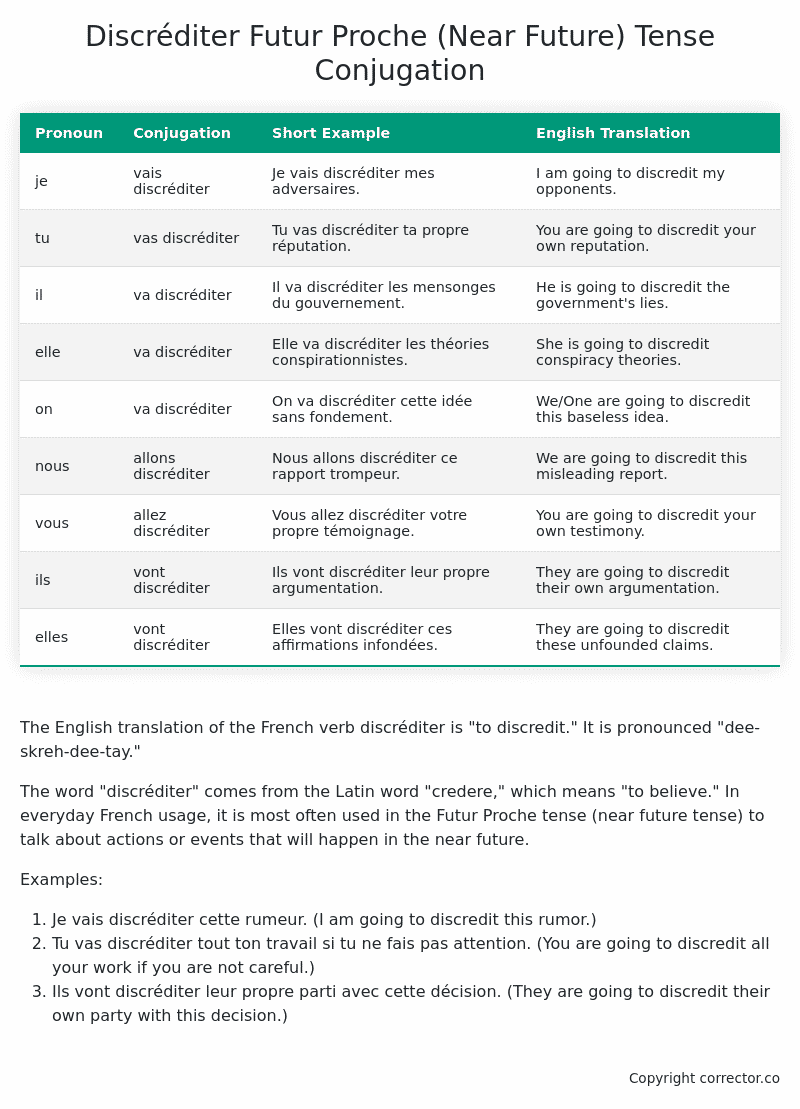Futur Proche (Near Future) Tense Conjugation of the French Verb discréditer
Introduction to the verb discréditer
The English translation of the French verb discréditer is “to discredit.” It is pronounced “dee-skreh-dee-tay.”
The word “discréditer” comes from the Latin word “credere,” which means “to believe.” In everyday French usage, it is most often used in the Futur Proche tense (near future tense) to talk about actions or events that will happen in the near future.
Examples:
- Je vais discréditer cette rumeur. (I am going to discredit this rumor.)
- Tu vas discréditer tout ton travail si tu ne fais pas attention. (You are going to discredit all your work if you are not careful.)
- Ils vont discréditer leur propre parti avec cette décision. (They are going to discredit their own party with this decision.)
Table of the Futur Proche (Near Future) Tense Conjugation of discréditer
| Pronoun | Conjugation | Short Example | English Translation |
|---|---|---|---|
| je | vais discréditer | Je vais discréditer mes adversaires. | I am going to discredit my opponents. |
| tu | vas discréditer | Tu vas discréditer ta propre réputation. | You are going to discredit your own reputation. |
| il | va discréditer | Il va discréditer les mensonges du gouvernement. | He is going to discredit the government’s lies. |
| elle | va discréditer | Elle va discréditer les théories conspirationnistes. | She is going to discredit conspiracy theories. |
| on | va discréditer | On va discréditer cette idée sans fondement. | We/One are going to discredit this baseless idea. |
| nous | allons discréditer | Nous allons discréditer ce rapport trompeur. | We are going to discredit this misleading report. |
| vous | allez discréditer | Vous allez discréditer votre propre témoignage. | You are going to discredit your own testimony. |
| ils | vont discréditer | Ils vont discréditer leur propre argumentation. | They are going to discredit their own argumentation. |
| elles | vont discréditer | Elles vont discréditer ces affirmations infondées. | They are going to discredit these unfounded claims. |
Other Conjugations for Discréditer.
Le Present (Present Tense) Conjugation of the French Verb discréditer
Imparfait (Imperfect) Tense Conjugation of the French Verb discréditer
Passé Simple (Simple Past) Tense Conjugation of the French Verb discréditer
Passé Composé (Present Perfect) Tense Conjugation of the French Verb discréditer
Futur Simple (Simple Future) Tense Conjugation of the French Verb discréditer
Futur Proche (Near Future) Tense Conjugation of the French Verb discréditer (this article)
Plus-que-parfait (Pluperfect) Tense Conjugation of the French Verb discréditer
Passé Antérieur (Past Anterior) Tense Conjugation of the French Verb discréditer
Futur Antérieur (Future Anterior) Tense Conjugation of the French Verb discréditer
Subjonctif Présent (Subjunctive Present) Tense Conjugation of the French Verb discréditer
Subjonctif Passé (Subjunctive Past) Tense Conjugation of the French Verb discréditer
Subjonctif Imparfait (Subjunctive Imperfect) Tense Conjugation of the French Verb discréditer
Conditionnel Présent (Conditional Present) Tense Conjugation of the French Verb discréditer
Conditionnel Passé (Conditional Past) Tense Conjugation of the French Verb discréditer
L’impératif Présent (Imperative Present) Tense Conjugation of the French Verb discréditer
L’infinitif Présent (Infinitive Present) Tense Conjugation of the French Verb discréditer
Struggling with French verbs or the language in general? Why not use our free French Grammar Checker – no registration required!
Get a FREE Download Study Sheet of this Conjugation 🔥
Simply right click the image below, click “save image” and get your free reference for the discréditer Futur Proche tense conjugation!

Discréditer – About the French Futur Proche (Near Future) Tense
Formation
1. Conjugate “aller” in the present tense according to the subject pronoun:
2. Add the infinitive of the main verb immediately after “aller.” For example:
Common Everyday Usage
Interactions with Other Tenses
Present Tense
Past Tense
Conditional Tense
Summary
I hope you enjoyed this article on the verb discréditer. Still in a learning mood? Check out another TOTALLY random French verb conjugation!


